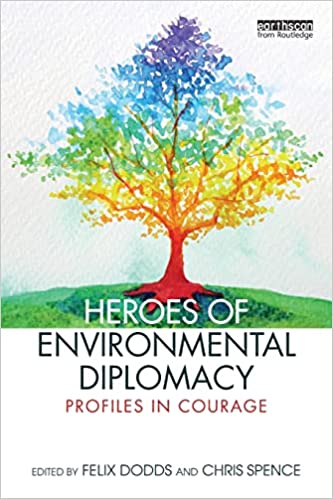Contributions of Forests to a Green Economy- October 3rd 2011
By Felix Dodds
October 3rd 2011
Thank you for allowing me to be a respondent to Prof. Sten Nilsson, my involvement here is possibly through the role I took a month ago in Bonn as Chair of the UN NGO DPI Conference on Sustainable Societies – Responsive Citizens where in our response to the call from Columbia for sustainable development goals to be an output from Rio+20 we put forward 17 SD Goals available from the UN DPI NGO web site. And one of them was on forests.
I found the background papers a good spur for our conversations here today.
In my five minutes I want to focus my contribution on two areas:
Certification and what goals the conference might consider for Rio+20.
The UNEP Report said that:
“Forests are a foundation of the green economy, sustaining a wide range of sectors and livelihoods”
Certification of sustainable forest management, such as FSC, is described in the Report as promising and relevant to shift trends of deforestation and degradation, but suffering from slow pace of expansion, in particular in the tropical and sub-tropical areas:
It goes on to say:
“There are reasons for optimism, but greening the forest sector requires a sustained effort. Various standards and certification schemes have provided a sound basis for practicing sustainable forest management, but their widespread uptake requires a strong mandate and consistent policies & markets.”
This could be done through:
• Include support for such forest certification in national biodiversity strategies and action plans as well in other plans focussing at limiting or reducing the ecological footprint of their societies, including through integrated product policies.”
• Support success of such certification systems by focussing public procurement practices at all levels at certified timber, timber products and other forest products and services, as well as promote certified products with their citizens.”
• And those that finance development activities in other countries, to commit to include forest certification in their programmes supporting local economies, social progress, environment and biodiversity protection.”
Rio+20 must take us on a different economic path – the term green economy has become in some circles controversial – we like to see it more as a transition economy from where we are to a one that puts sustainability at the center. It’s clear that we have been the most irresponsible generation this planet has seen.
The parallels of the ecological problems with the financial crisis are clear. The banks and financial institutions privatized the gains and socialized the losses.
We are doing the same with the planets natural capital.
Our present lifestyles are drawing down the ecological capital from other parts of the world and from future generations. We are increasingly becoming the most irresponsible generation our planet has seen.
The principal goal of our economy should be to improve the lives of the entire world's people and to free them from want and ignorance - without compromising the planet itself.
Only a couple of weeks ago Aviva the largest insurance company in the UK the sixth in the world called for during the UN GA a convention on corporate sustainability which would make green accounting mandatory for companies listed on the stock exchanges. Maybe this is the way to go the call has considerable support within industry.
At the DPI Conference NGOs called for a sustainable development goal on forests and this was that
By 2020, all remaining frontier forests are protected from conversion and degradation, consistent with the Strategic Plan for Biodiversity adopted at COP10,
They went on to say that a well-resourced and equably governed REDD+ mechanism should be put in place, which respects the rights and knowledge of indigenous peoples and local communities and other environmental and governance safeguards, to reward developing countries for protection and sustainable management of their forests, not only for carbon capture and storage but for their wider ecological services.
A policy of no net loss of forestland, globally and nationally, is also achieved by 2020. At that time, all new forest areas cleared will be offset by ecologically sound restoration of forests in nearby areas.
Restoration of over 150 million hectares of cleared or degraded forest landscapes is achieved by 2020, with the creation of millions of new jobs and enhanced livelihoods, improved security and adaptation to climate change.
We need to see a reduction of deforestation emissions by key corporations and their supply chains committing to avoid the purchase of products that cause deforestation, such as soy or cattle from deforested lands in the Brazilian Amazon, palm oil from deforested agricultural land in Indonesia, or illegal wood and wood products throughout the world.
If a convention on corporate sustainability were too launched in RiO+20 this might immediately focus the minds and actions of companies.
On this generation falls the burden of proving to the world that we really mean it when we say all people are created free and are equal and should benefit from the fruits of this planet we live in in a sustainable way.
All of us might wish at times that we lived in a more tranquil world,
But we don't.
And if our times are difficult and perplexing, so are they challenging and filled with opportunity.
- Created on .

